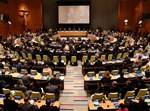Published on Fri, 2016-09-23 22:33
The adoption of the 2030 Agenda by the UN coincided with a change of government in Argentina, which is reversing the public policies that were put in place to deal with the serious social, economic, institutional and political crisis of 2001 and 2002. In its first months in power, the political coalition Cambiemos (Spanish for Let’s change) shifted away from a development model based on strengthening the domestic market, trade protectionism, expansion of social rights and an active role of the state in income redistribution through the collection of taxes on exports of agricultural products, towards a model favouring free trade, a competitive position in the global market, a lower level of state intervention in the overall economy and a reduction in taxes for the rich. Instead of continuing to expand social protection as required by the SDGs, the current government is aligning public policies with the interests of the sectors with greater political and economic power. The violation of various economic and social rights, which has occurred in a very short time, is creating a gradual and growing rejection within different social sectors. |
Published on Fri, 2016-09-23 10:57
The 2030 Agenda is both a problem and a solution for the UN system. The UN, especially the UN development system, must be encouraged to return to its value-driven role in the public interest, grounded in the explicit adoption of norms and standards and delivered through programming that does not deviate from its core business. Otherwise it will find itself caught in a self-inflicted vicious circle of decline. “More of the same” will see the continuation of its shrinking role in global affairs at a time when so many challenges require international co-operation and resolve. |
Published on Fri, 2016-09-23 01:20
Unfortunately, whenever civil society and government strike discussions on human rights a certain unease sets in. The mood quickly dampens. On one hand, government mounts a defensive posture and on the other, civil society embarks on an offensive strategy. This gets worse when you throw in the word taxation. Like a spark to an inflammable concoction, you have the perfect recipe for an explosive discussion. |
Published on Fri, 2016-09-16 09:15
The 2030 Agenda and its 17 Sustainable Development Goals (SDGs) comprises a number of goals which concern the internal situation in Germany. Among these are goals which derive from the human rights obligations, such as in the areas of education, health and social security. Examples include reducing the proportion of poor people in Germany by half and increasing the proportion of young people who complete secondary education. Other goals address the external effects of German politics and economy. They demand domestic measures which also have immediate impacts for people in the countries of the South. These include goals for reducing resource use, for changing unsustainable consumption and production patterns, but also for the relationship to migrants and refugees. |
Published on Fri, 2016-09-16 09:10
In Azerbaijan reduced budget revenues and cuts in government spending are the result of the decline in crude oil prices, the main export of the country. The Social Watch coalition in Azerbaijan examines how these constraints can also hamper the financing of sustainable development initiatives. As crude oil prices have tumbled, a worsening of the country’s fiscal balance could gradually lead to an increase in the public debt burden and threaten fiscal sustainability in the long term. Azerbaijan’s sovereign wealth fund, SOFAZ, now has very limited profits from the sale of oil, and will contribute less to the fiscal revenues of the state as a consequence. The national state-owned oil-gas company, SOCAR, temporarily cancelled its plans for a new oil-gas refining and petrochemical complex because of the rapid fall in crude oil prices. However, at the same time, the new low oil price environment also offers an opportunity to boost a new wave of fiscal and public administration reforms in Azerbaijan. |
SUSCRIBE TO OUR NEWSLETTER







